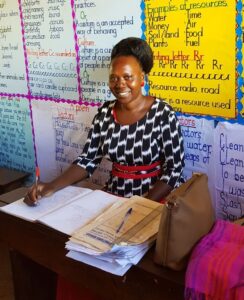I am Juliet Mwogeza, a teacher at Nakanyonyi Primary School in Jinja district in Uganda. I am very pleased to have this opportunity to share my story with the wider education community.
Two years ago, I had a negative attitude towards teaching and the handling of learners in my classroom. I thought that my training from the teaching college was enough to inform all of my teaching, so I never looked for new ideas or innovations. As a result of my actions, learners were often late and hardly participated in classroom activities – but I was satisfied because they attended some lessons and I covered all of the content that I was supposed to teach. I didn’t think I needed feedback from my colleagues and there was no culture of peer learning in my school.
But when the STiR network meetings started in my school, I realised that I had been doing a disservice both to my learners and myself, as I wasn’t getting any positive results from my delivery. After one lesson, in which the learners had sat in awkward silence and showed a general lack of interest in learning, I realised that I had not provided any opportunities for active participation or to give feedback on my teaching. I discussed this challenge with my colleagues in the next network meeting, and found that this was common to my fellow teachers. We were encouraged that together we could make positive changes in our classrooms.
I identified that the majority of my learners did not believe in themselves, and they did not participate actively because they were afraid to make mistakes in front of their peers. In a network meeting about growth mindset, we learned that intelligence grows with effort and that mistakes are part of learning. We also learned new ways to praise effort rather than ability, and I tried to encourage learners to answer more questions and give more feedback, helping me to understand whether they are learning and to respond effectively. This has really helped my teaching practice.

The STiR network meetings are very different from other training I have experienced because they build our own autonomy to find solutions to the challenges we face, rather than imposing solutions on us. We have been encouraged to give peer support to one another which has developed a culture of teamwork and collaborative learning among the entire staff. I have learned to consult my colleagues and work as part of a team, and I’m now very open to their constructive feedback. I also ask for feedback from my learners to understand their individual learning needs and respond to their concerns.
As a result of the meetings, I have developed my own self-esteem and confidence to improve despite the challenges I have faced. I have learned that creating a positive learning environment is not only good for the learners, but also for the teacher, as it enhances our relationships. I have also learned to appreciate and recognise my learners, praising their effort rather than just their ability, which has greatly changed their mindsets in the classroom. I now create action plans aligned with my teaching priorities and embrace opportunities to be more creative and innovative, finding solutions to challenges so that learners enjoy learning and want to be in school.
My learners have also gradually developed their level of self-esteem and confidence within the classroom. They are more lively and look forward to taking part in lessons, where they express themselves more freely and are unafraid to make mistakes. As a result, absenteeism has reduced, learners ask for clarification more regularly and their retention and application of learned concepts have increased over time.
I have now fallen back in love with my job, and believe in helping my learners perform beyond their limits! I thank STiR for introducing teacher networks to my school and hope that they continue for many years to come.

